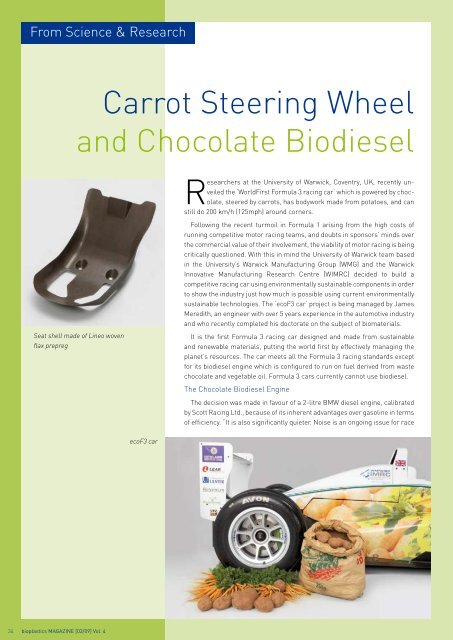bioplasticsMAGAZINE_0903
bioplasticsMAGAZINE_0903
bioplasticsMAGAZINE_0903
You also want an ePaper? Increase the reach of your titles
YUMPU automatically turns print PDFs into web optimized ePapers that Google loves.
From Science & Research<br />
Carrot Steering Wheel<br />
and Chocolate Biodiesel<br />
Researchers at the University of Warwick, Coventry, UK, recently unveiled<br />
the ‘WorldFirst Formula 3 racing car’ which is powered by chocolate,<br />
steered by carrots, has bodywork made from potatoes, and can<br />
still do 200 km/h (12mph) around corners.<br />
Seat shell made of Lineo woven<br />
flax prepreg<br />
Following the recent turmoil in Formula 1 arising from the high costs of<br />
running competitive motor racing teams, and doubts in sponsors’ minds over<br />
the commercial value of their involvement, the viability of motor racing is being<br />
critically questioned. With this in mind the University of Warwick team based<br />
in the University’s Warwick Manufacturing Group (WMG) and the Warwick<br />
Innovative Manufacturing Research Centre (WIMRC) decided to build a<br />
competitive racing car using environmentally sustainable components in order<br />
to show the industry just how much is possible using current environmentally<br />
sustainable technologies. The ‘ecoF3 car’ project is being managed by James<br />
Meredith, an engineer with over years experience in the automotive industry<br />
and who recently completed his doctorate on the subject of biomaterials.<br />
It is the first Formula 3 racing car designed and made from sustainable<br />
and renewable materials, putting the world first by effectively managing the<br />
planet’s resources. The car meets all the Formula 3 racing standards except<br />
for its biodiesel engine which is configured to run on fuel derived from waste<br />
chocolate and vegetable oil. Formula 3 cars currently cannot use biodiesel.<br />
The Chocolate Biodiesel Engine<br />
The decision was made in favour of a 2-litre BMW diesel engine, calibrated<br />
by Scott Racing Ltd., because of its inherent advantages over gasoline in terms<br />
of efficiency. “It is also significantly quieter. Noise is an ongoing issue for race<br />
ecoF3 car<br />
34 bioplastics MAGAZINE [03/09] Vol. 4


















